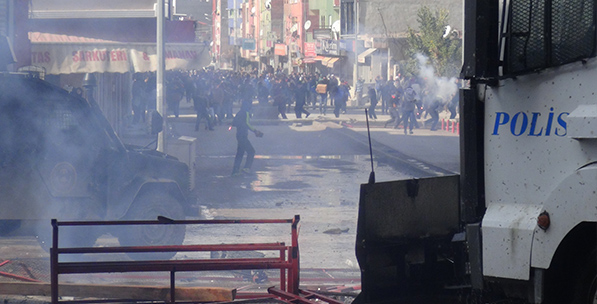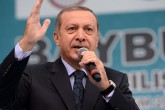The Kobani protests, which followed a call from the Peoples’ Democratic Party (HDP) to Kurdish nationalists around the country, have claimed over 30 lives and left hundreds injured. The protests, fueled by speculation that the government supported the Islamic State of Iraq and al-Sham (ISIS), the wave of anger triggered acts of vandalism in 27 provinces including Istanbul and Diyarbakır as well as 68 districts.
The demonstrations indicate that the Syrian civil war has turned into a multi-dimensional domestic issue for regional powers and, in particular, for Turkey. As such, the conflict has the capacity to trigger a number of problems with regard to the influx of refugees and border security as well as the frustration of Alevi hardliners and Kurdish nationalists. Let us recall that the Kurdish nationalist movement steered clear of the Gezi Park protests thanks to the reconciliation process and Abdullah Öcalan’s political leadership even though they found it difficult to account for their actions under pressure from their social base. Today, there are more questions: Does the PKK’s targeting of the Free Cause Party (Hüda-Par), a political party ideologically affiliated with Hezbollah, usher in a new era? What does the construction of a close relationship between Kobani and the reconciliation process in the face of the government’s commitment to the talks really mean?
The fear of a massacre in Kobani breathes new life into the Kurdish nationalist movement and helps form the basis of the PKK’s refusal to lay down its arms. Meanwhile, the potential failure of the so-called revolution in Rojava causes anger in and vandalism by young people on the streets. The greatest risk involved here, without a doubt, is that violent clashes between the PKK and Hüda-Par might continue in the coming days, which would serve as a convenient excuse to disturb the peace that the reconciliation process has thus far facilitated. Again, such a development would lead Kurdish Islamists who believe that the reconciliation process empowers the PKK to violent means. Similarly, national public opinion, which feels uncomfortable with the Kurdish nationalist movement’s snobbish attitude, could react against the demonstrations to place the reconciliation process at risk. In this sense, anger could lead to more anger.
From the government’s standpoint, the Kobani protests bear critical importance. There are three distinct constituencies with enough of a social base and independent discourse: the Left and the Alevi community, the Gülen Movement, the PKK and the HDP – all of whom have international networks and are capable of formulating media strategies. As such, they can predict and discredit the Justice and Development Party (AK Party) government’s policies. Over the past couple of years, all three groups have shown an interest in undermining the government. While the Gezi Park protests attested to the power of the Left and the Alevi community, the Gülen Movement attempted to challenge the government through the Dec. 17 operation. Today, the Kobani protests represent the PKK leadership’s ability to oppose the authorities.
The government, however, must pay attention to the fact that the PKK can address the Kurdish community more effectively than others with regard to both the reconciliation process and the anti-ISIS campaign. As such, the organization associates the concrete results of the reconciliation process with its military power while blaming the ISIS threat on the government. Turkey’s reluctance to engage in unilateral military action inside Syria, however, has remained unaltered over the course of the conflict despite the human tragedy that befell Arabs and Turkmens among others.
Having kept their silence about the Bashar al-Assad regime’s atrocities in the past, the Democratic Union Party (PYD) and the HDP have proved quite talented in manipulating public opinion about the government’s alleged inaction. Distracting attention from the fact that ISIS advances in Syria and Iraq hurt Turke
In this article
- Domestic Policy
- Opinion
- Abdullah Öcalan
- Alevi Community | Alawite Community
- Assad Regime
- Bashar Al Assad
- Civil War
- DAESH
- Hezbollah
- Iraq
- ISIS
- Islam
- Islamic
- Istanbul
- Kobane
- Kobani Protests
- Kurdish Community
- Kurdish Nationalism
- Kurdistan Workers' Party Terrorist Organization (PKK)
- May 28-August 20 2013 The Gezi Park Protests
- Middle East
- PKK - YPG - SDF - PYD - YPJ - SDG - HBDH - HPG - KCK - PJAK - TAK - YBŞ
- Regional Power
- Syria
- Syrian Civil War
- Syrian Conflict
- Syrian Crisis
- Syrian Regime
- taksim
- Terror
- Türkiye's Justice and Development Party | AK Party (AK Parti)
- Türkiye's Peoples' Democratic Party (HDP)
- United States (US)



